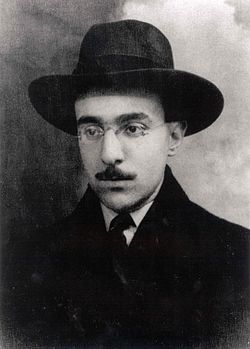Fernando Pessoa Quote
Everything is absurd.1 man spends his life earning money which he then saves even though he has no children 2 leave it 2. another puts all his efforts into becoming famous so that he'll b remembered once dead, yet he doesn't believe in a survival of the soul that would give him knowledge of that fame. yet another wears himself out looking 4 things he doesn't even like.
Fernando Pessoa
everything is absurd.1 man spends his life earning money which he then saves even though he has no children 2 leave it 2. another puts all his efforts into becoming famous so that he'll b remembered once dead, yet he doesn't believe in a survival of the soul that would give him knowledge of that fame. yet another wears himself out looking 4 things he doesn't even like.
Tags:
life and living
Related Quotes
For everything in this journey of life we are on, there is a right wing and a left wing: for the wing of love there is anger; for the wing of destiny there is fear; for the wing of pain there is heali...
C. JoyBell C.
Tags:
ancient, flight, flying, human race, humanity, imperfection, inspirational, inspirational life, inspiring, journey
About Fernando Pessoa
Fernando António Nogueira de Seabra Pessoa (; Portuguese: [fɨɾˈnɐ̃du pɨˈsoɐ]; 13 June 1888 – 30 November 1935) was a Portuguese poet, writer, literary critic, translator, and publisher. He has been described as one of the most significant literary figures of the 20th century and one of the greatest poets in the Portuguese language. He also wrote in and translated from English and French.
Pessoa was a prolific writer both in his own name and approximately seventy-five other names, of which three stand out: Alberto Caeiro, Álvaro de Campos, and Ricardo Reis. He did not define these as pseudonyms because he felt that this did not capture their true independent intellectual life and instead called them heteronyms, a term he invented. These imaginary figures sometimes held unpopular or extreme views.
Pessoa was a prolific writer both in his own name and approximately seventy-five other names, of which three stand out: Alberto Caeiro, Álvaro de Campos, and Ricardo Reis. He did not define these as pseudonyms because he felt that this did not capture their true independent intellectual life and instead called them heteronyms, a term he invented. These imaginary figures sometimes held unpopular or extreme views.
